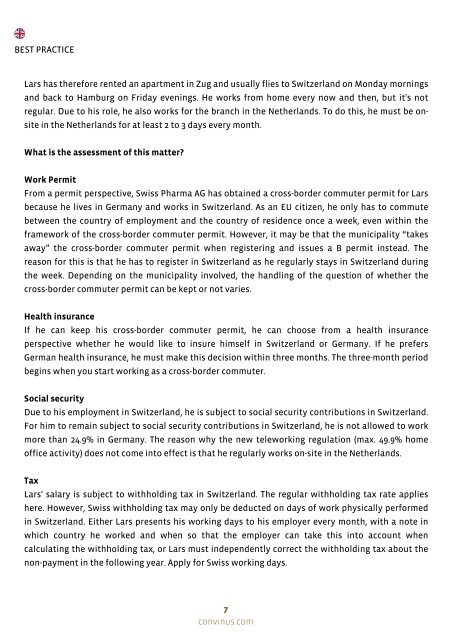CONVINUS Global Mobility Alert - Week 12.2024
Create successful ePaper yourself
Turn your PDF publications into a flip-book with our unique Google optimized e-Paper software.
BEST PRACTICE<br />
Lars has therefore rented an apartment in Zug and usually flies to Switzerland on Monday mornings<br />
and back to Hamburg on Friday evenings. He works from home every now and then, but it's not<br />
regular. Due to his role, he also works for the branch in the Netherlands. To do this, he must be onsite<br />
in the Netherlands for at least 2 to 3 days every month.<br />
What is the assessment of this matter?<br />
Work Permit<br />
From a permit perspective, Swiss Pharma AG has obtained a cross-border commuter permit for Lars<br />
because he lives in Germany and works in Switzerland. As an EU citizen, he only has to commute<br />
between the country of employment and the country of residence once a week, even within the<br />
framework of the cross-border commuter permit. However, it may be that the municipality “takes<br />
away” the cross-border commuter permit when registering and issues a B permit instead. The<br />
reason for this is that he has to register in Switzerland as he regularly stays in Switzerland during<br />
the week. Depending on the municipality involved, the handling of the question of whether the<br />
cross-border commuter permit can be kept or not varies.<br />
Health insurance<br />
If he can keep his cross-border commuter permit, he can choose from a health insurance<br />
perspective whether he would like to insure himself in Switzerland or Germany. If he prefers<br />
German health insurance, he must make this decision within three months. The three-month period<br />
begins when you start working as a cross-border commuter.<br />
Social security<br />
Due to his employment in Switzerland, he is subject to social security contributions in Switzerland.<br />
For him to remain subject to social security contributions in Switzerland, he is not allowed to work<br />
more than 24.9% in Germany. The reason why the new teleworking regulation (max. 49.9% home<br />
office activity) does not come into effect is that he regularly works on-site in the Netherlands.<br />
Tax<br />
Lars' salary is subject to withholding tax in Switzerland. The regular withholding tax rate applies<br />
here. However, Swiss withholding tax may only be deducted on days of work physically performed<br />
in Switzerland. Either Lars presents his working days to his employer every month, with a note in<br />
which country he worked and when so that the employer can take this into account when<br />
calculating the withholding tax, or Lars must independently correct the withholding tax about the<br />
non-payment in the following year. Apply for Swiss working days.<br />
7<br />
convinus.com


















